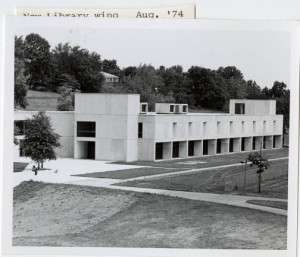
University Archives. Special Collections, University of Maryland, Baltimore County
The Policy Sciences Graduate Program was conceived in 1972. Policy science at that time was an emerging field that used an interdisciplinary approach to solve local, regional and national problems. UMBC was a young institution that had opened in 1966 with a philosophy based on innovation and inclusiveness. Consistent with that philosophy, UMBC established a policy sciences education center in the mid-Atlantic region.The master’s program enrolled its first class of 12 students in 1974. The first nine Ph.D. students were admitted in 1978. The program became the Department of Public Policy in 2003. Once housed in the Administration Building, the department moved into the new Public Policy Building in 2004. In 2014, UMBC established the School of Public Policy.
Today, Public Policy is noted for a distinguished and nationally recognized faculty. We have 9 full time faculty and 34 affiliated faculty from the departments of economics; emergency health services; education; geography and environmental systems; history; political science; psychology; and sociology. Their research addresses the region’s most significant problems: health, education, urban development, poverty. Our program was ranked No. 10 in the nation in faculty productivity.
In 1982, the department established a research institute, the Maryland Institute for Policy Analysis and Research (MIPAR). MIPAR, with $22 million in active research awards, has grown to become UMBC’s center for applied public policy research. MIPAR conducted surveys, focus groups, policy analyses and program evaluations on a variety of topics. Its activities were supported by federal agencies, private foundations and state and local governments. MIPAR has since evolved into CARAT, the new Creative Achievement and Research Administration Team in the College of Arts, Humanities, and Social Sciences.
As for our students, today Public Policy enrolls 130 students. Our M.P.P. and Ph.D. graduates influence government policies, conduct cutting edge social science research, play key roles in philanthropic organizations, and teach and administer in education.
It is important to acknowledge the people whose drive and commitment in the early years made the program the success it is today. Fred Wirt, Ben Kleinberg, Allan Rosenbaum, George La Noue, Marsha Goldfarb, Fred Pinkus and Jere Cohen were all instrumental to the department in its first decade in the 1970s. Adam Yarmolinsky, Marv Mandell, Cheryl Miller, Don Norris and Tim Brennan joined the program in the 1980s. Dave Marcotte, Nancy Miller and Pattee Fletcher joined the faculty in the 1990s, and David Salkever, John Rennie Short, Adele Kirk, Lauren Edwards, Susan Sterett, Pamela Bennett, Jane Lincove, and Zoë McLaren arrived in the last decade. Our newest faculty include Mir Usman Ali, Yusuke Kuwayama, and Director Loren Henderson, who joined us from the Department of Sociology, Anthropology, and Public Health. In 2024, Chul Hyun Park joined the school as part of a growing effort to offer cybersecurity as a policy focus.
As we train students to be active participants in the development of new policies and programs, we look forward with excitement to the next 50 years.